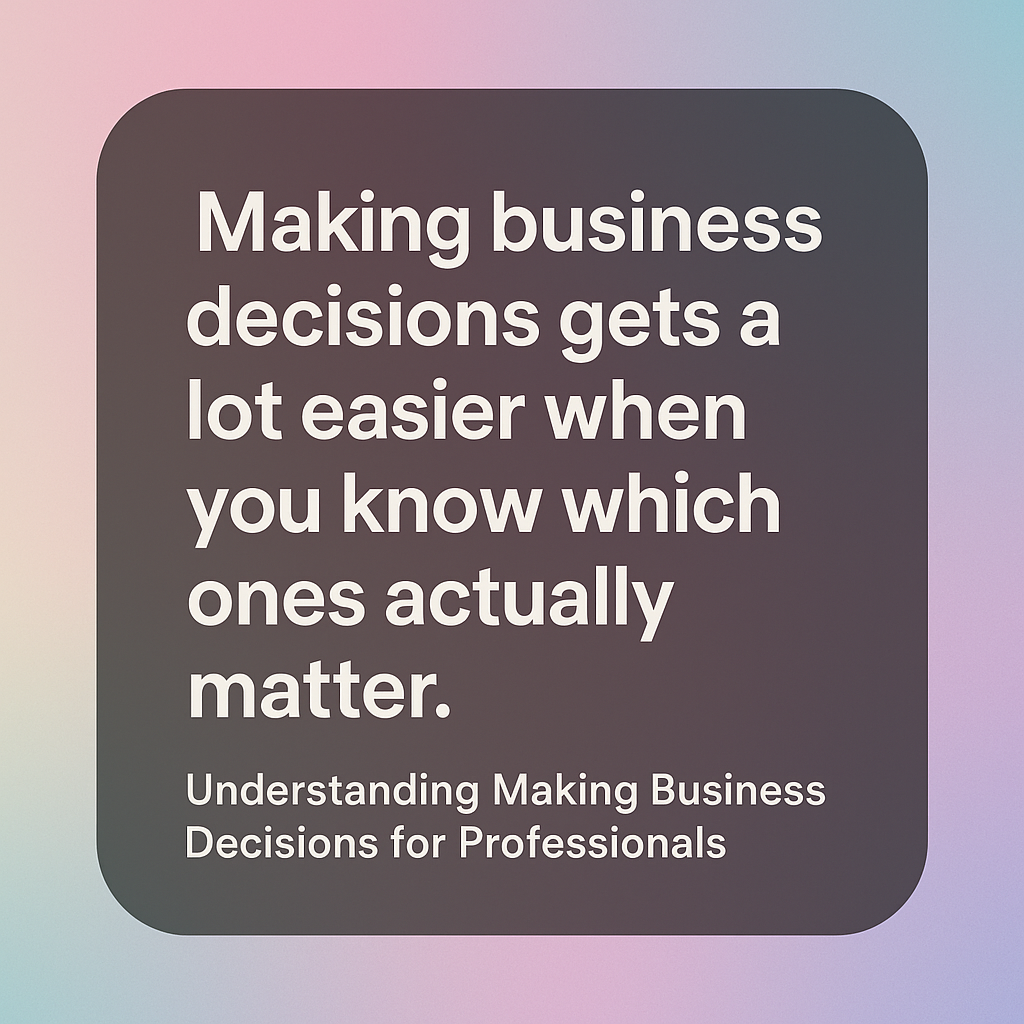
Every solopreneur faces a moment where one choice can change everything. Research from Harvard Business School shows that effective decision-making is the main driver of organizational performance and competitive advantage. Most people think business decisions are just routine steps or boxes to check. The real surprise is how understanding just a few key concepts can help transform choices from stress points into chances for massive growth.
Table of Contents
- Defining Business Decisions: What Are They?
- The Importance of Making Business Decisions: Why It Matters
- The Process of Making Business Decisions: How It Works
- Key Concepts in Business Decision-Making: What to Know
- Real-World Examples of Effective Business Decisions
Quick Summary
| Takeaway | Explanation |
|---|---|
| Intentionality is key in decisions | Purpose-driven choices align with specific business goals and enhance strategic outcomes. |
| Balance risk and opportunity | Evaluate potential outcomes and identify growth avenues to make informed decisions. |
| Embrace adaptability for success | Rapid responses to market changes are essential for maintaining competitiveness and relevance. |
| Leverage data for informed choices | Use analytical tools to ground decisions in empirical evidence for better outcomes. |
| View decisions as learning opportunities | Each choice contributes to professional growth and helps refine future decision-making processes. |
Defining Business Decisions: What Are They?
Business decisions represent strategic choices professionals make to navigate challenges, pursue opportunities, and drive organizational progress. These decisions form the fundamental framework through which solopreneurs and freelancers transform vision into actionable outcomes. Understanding what constitutes a business decision is crucial for making informed choices that propel professional growth.
The Essence of Business Decision Making
At its core, a business decision involves selecting a specific course of action from multiple alternatives to achieve desired objectives. For solopreneurs, these decisions can range from pricing strategies and service offerings to client selection and operational processes. According to research from the Minnesota Department of Employment and Economic Development, effective decision making requires understanding the necessity and urgency of the choice while evaluating potential implications.
Key characteristics of business decisions include:
- Intentionality: Decisions are purposeful and aligned with specific business goals
- Risk Assessment: Evaluating potential positive and negative outcomes
- Resource Allocation: Determining how time, money, and energy will be invested
Types of Business Decisions
Making business decisions often falls into two categories: short-term and long-term. Short-term choices solve immediate needs like replying to a client or shifting a deadline, while long-term ones guide strategy, such as adding services or entering new markets.
Research shows short-term decisions need quick thinking, while long-term ones call for deeper analysis. Understanding both sides of making business decisions helps solopreneurs balance daily demands with future growth.
| Decision Type | Purpose | Time Horizon | Decision Example | Key Considerations |
|---|---|---|---|---|
| Short-Term | Address immediate operational needs | Days to Months | Adjusting project timeline | Quick analysis, flexibility |
| Long-Term | Shape strategic direction and growth | Months to Years | Expanding service offerings | Comprehensive analysis, vision alignment |
| Short-Term | Solve urgent client or project issues | Immediate | Responding to a client inquiry | Speed, responsiveness |
| Long-Term | Establish market position and brand identity | Extended | Targeting a new market segment | Broad impact, future orientation |

For solopreneurs, making business decisions means balancing intuition with rational analysis. By recognizing how decisions work at their core, professionals can build a structured, confident way to navigate entrepreneurship.
The Importance of Making Business Decisions: Why It Matters
Making business decisions is more than admin, it shapes growth, manages risk, and defines future opportunities. For solopreneurs, seeing decisions as strategic moments can be the difference between stagnation and success.
Strategic Impact and Professional Progression
Every business decision carries significant weight in determining professional outcomes. According to research from Harvard Business School, effective decision-making is a fundamental driver of organizational performance and competitive advantage. For independent professionals, this translates into direct implications for business development, client relationships, and personal brand reputation.
Key reasons why business decisions matter include:
- Opportunity Identification: Recognizing and acting on potential growth avenues
- Risk Mitigation: Proactively managing potential challenges and uncertainties
- Resource Optimization: Strategically allocating time, energy, and financial resources
Consequences of Indecision and Poor Choices
For solopreneurs, hesitation or inconsistency in making business decisions leads to lost opportunities, weaker client trust, and stalled momentum. Thoughtful, deliberate choices instead build reliability and set the stage for lasting success.
The process of making intentional business decisions involves:
- Gathering comprehensive information
- Analyzing potential outcomes
- Aligning choices with long-term professional goals
- Maintaining flexibility for future adjustments
Ultimately, making business decisions isn’t about perfection but about creating a system for growth. By viewing each choice as a chance to learn and advance, solopreneurs can turn challenges into lasting success.
The Process of Making Business Decisions: How It Works
For solopreneurs, making business decisions calls for strategy, emotional intelligence, and clear analysis. When done with intention, choices shift from random actions to purposeful steps that drive growth.
Fundamental Components of Decision Making
According to research examining strategic decision frameworks, successful decision-making involves integrating multiple cognitive and analytical approaches. The process is not linear but a dynamic interaction between rational assessment and intuitive understanding.
Key foundational elements include:
- Problem Identification: Clearly defining the challenge or opportunity
- Information Gathering: Collecting relevant data and insights
- Contextual Analysis: Understanding broader implications and potential consequences
Navigating Emotional and Rational Dimensions
Business decisions are not purely logical exercises. They involve complex interactions between rational thought processes and emotional intelligence. Professionals must balance objective data analysis with intuitive insights, recognizing that emotions can provide valuable contextual understanding beyond numerical metrics.
Essential strategies for balanced decision-making involve:
- Acknowledging personal biases
- Seeking diverse perspectives
- Creating mental space for reflection
- Developing emotional self-awareness
Effective decision-making requires professionals to view each choice as a learning opportunity. By cultivating a mindset of continuous improvement and adaptability, solopreneurs can transform decision-making from a potential source of stress into a powerful tool for strategic growth and professional development. The goal is not perfection but progress through thoughtful, intentional choices that align with individual business vision and goals.
This table summarizes the fundamental components of the business decision-making process, outlining each stage and its primary focus for clarity.
| Component | Description | Main Focus |
|---|---|---|
| Problem Identification | Clearly defining the challenge or opportunity | Establish context and need |
| Information Gathering | Collecting relevant data and insights | Build understanding |
| Contextual Analysis | Understanding broader implications and consequences | Assess potential impact |
| Balanced Evaluation | Integrating rational and emotional considerations | Make informed, aligned choices |
| Adaptation | Remaining flexible for future adjustments | Enable continuous improvement and growth |
Key Concepts in Business Decision-Making: What to Know
Business decision-making extends beyond simple choice selection. It represents a complex cognitive process that integrates strategic thinking, emotional intelligence, and analytical reasoning. For solopreneurs and freelancers, understanding these foundational concepts transforms decision-making from a potentially overwhelming task into a structured, intentional practice.
Cognitive Elements of Decision Making
According to research from Harvard Business School Online, effective decision-making involves multiple interconnected mental processes. Professionals must develop sophisticated cognitive skills that enable them to navigate complex business environments with clarity and confidence.
Critical cognitive components include:
- Analytical Thinking: Breaking down complex problems into manageable components
- Systems Perspective: Understanding interconnected business dynamics
- Pattern Recognition: Identifying recurring themes and potential opportunities
Psychological Foundations of Choice
Making business decisions is shaped by psychology—biases, experiences, and mental frameworks. Successful solopreneurs build self-awareness and strategies to overcome these barriers, ensuring clearer, more rational choices.
Key psychological considerations involve:
- Recognizing personal cognitive biases
- Developing emotional regulation skills
- Creating psychological safety for exploring different perspectives
- Maintaining mental flexibility during uncertainty
Mastering making business decisions isn’t about removing uncertainty but building strong mental frameworks for smart choices. With this mindset, solopreneurs turn decision-making from a stress point into a growth tool.
This table highlights key cognitive and psychological elements involved in business decision-making to help solopreneurs recognize the mental processes at play.
| Element Type | Key Component | Description |
|---|---|---|
| Cognitive | Analytical Thinking | Breaking down complex problems into manageable parts |
| Cognitive | Systems Perspective | Understanding interconnected business dynamics |
| Cognitive | Pattern Recognition | Identifying recurring themes and opportunities |
| Psychological | Cognitive Bias Awareness | Recognizing and mitigating mental shortcuts that distort perception |
| Psychological | Emotional Regulation | Managing feelings to maintain balanced decision-making |
| Psychological | Mental Flexibility | Adapting thinking during times of uncertainty |
Real-World Examples of Effective Business Decisions
Effective making business decisions is practical, not theoretical. By learning from real-world scenarios, solopreneurs gain insights that shape strategy and drive better outcomes.
Strategic Pivots and Adaptation
According to business research published in the Financial Times, successful businesses demonstrate remarkable adaptability through strategic decision-making. Take Zara, for instance, which revolutionized the fashion industry by creating an ultra-responsive supply chain that enables rapid product development and minimal marketing expenditure.
Key characteristics of successful strategic decisions include:
- Rapid Response: Quickly adapting to market changes
- Minimal Resource Investment: Optimizing operational efficiency
- Customer-Centric Approach: Prioritizing market needs and preferences
Data-Driven Decision Making
Modern business decisions increasingly rely on sophisticated data analytics to drive strategic choices. Innovative companies leverage technological insights to transform raw information into actionable intelligence. This approach allows professionals to move beyond intuition and ground their decisions in empirical evidence.
Critical components of data-driven decision making involve:
- Collecting comprehensive and relevant data
- Utilizing advanced analytical tools
- Translating insights into strategic actions
- Maintaining flexibility for continuous improvement
For solopreneurs, effective business decisions are not about achieving perfection but creating a dynamic framework that enables continuous learning and strategic adaptation. By studying successful examples and understanding the underlying principles of strategic choice, independent professionals can develop more nuanced, confident approaches to navigating complex business landscapes.

Transform Uncertainty into Confident Business Growth
Many solopreneurs struggle with the pressure of making business decisions that shape their future. The article outlined how challenges like balancing intuition and strategic analysis, evaluating risks, and making sense of complex information can feel overwhelming. If you are feeling stuck between indecision and action, you are not alone. Fluum gives you the support and resources needed to make intentional, profitable choices every day.

See how Fluum’s all-in-one AI platform turns confusion into clarity by streamlining sales funnels, client management, and marketing—focusing your time where it matters most. Access proven growth guides and templates designed specifically for professionals who want structure with flexibility. Take the next step and unlock your confidence in business decision-making. Start now with Fluum and experience a new level of autonomy and progress.
Frequently Asked Questions
What are business decisions?
Business decisions are strategic choices made by professionals to address challenges, seize opportunities, and drive organizational growth. These decisions range from pricing strategies to client selection and operational processes.
How can I improve my business decision-making?
Improving business decision-making involves gathering comprehensive information, analyzing potential outcomes, and aligning choices with long-term professional goals. Developing emotional intelligence and self-awareness also enhances decision quality.
What types of business decisions exist?
Business decisions can be categorized into short-term and long-term choices. Short-term decisions address immediate operational needs, while long-term decisions involve strategic planning that shapes the overall direction of a professional practice.
Why is it important to make effective business decisions?
Effective business decisions are crucial as they determine professional outcomes, help identify growth opportunities, mitigate risks, and optimize resource allocation. They create a foundation for reliability and strategic thinking within a business.



